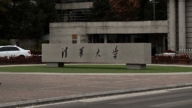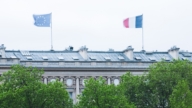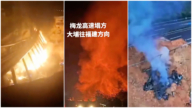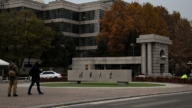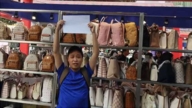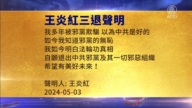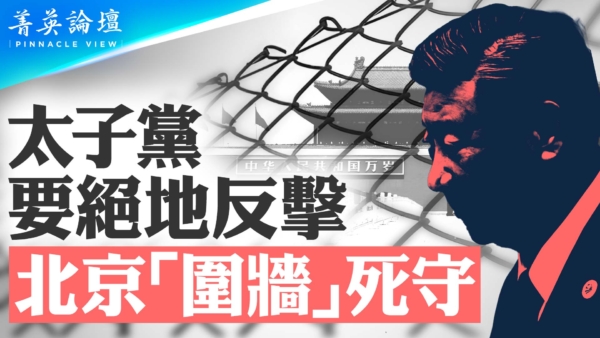【新唐人2011年8月24日讯】中共国务院规定公开三公消费期限的一个多月之后,外交部,侨办和港澳办等三个部门仍然迟迟不予公开。在媒体的追问下,周一外交部回应说今年不打算公开三公消费,理由是涉及国家秘密。而全国人大代表叶青估计,外交部的“‘三公经费’会是一个天文数字”。
在大陆98个中央部门中,截至8月9号,只有外交部、港澳办和侨办,还没有公布“三公”经费,也就是公款出国、公务接待、公务用车的费用。8月22号大陆媒体致电外交部,外交部财务司表示,今年外交部将不公开“三公”经费,原因是有关预算涉及国家秘密。
“中国艺术研究院”学者吴祚来认为,国家秘密经费和三公消费是两个领域,不应该混为一谈。
吴祚来:“如果涉及到国家秘密的部分,他应该有特别的经费,他不应该把三公消费也作为国家秘密,三公消费是三公消费,国家秘密是国家秘密,国家秘密应该有别的渠道。比如说从国防经费或者从安全部经费,应该从那里支出。”
湖北省统计局副局长叶青说,除了国家安全局等几个涉及国家安全的部门的资料可以不公开之外,剩下的部门不能例外。叶青也表示:外交部驻外使馆众多,外交礼仪要求用高档汽车,估计外交部的‘三公’会是一个天文数字。
吴祚来指出,中共官员应该学习美国副总统拜登,和美国驻华大使骆家辉的廉洁作风。
吴祚来:“你看美国副总统来吃炸酱面不也挺好的吗?骆家辉他背一个包,自己提着包,带着孩子,平民化的作风,共产党员应该学习吧。”
《经济观察网》的评论说,外交部以保密为由,暂不公开三公经费,逻辑上难以成立。唯一可能的情形是,外交部把本部门人员出国从事外交业务的差旅费及在海外请客费用,都统统纳入了三公经费的公费出国、公费接待费用的会计课目之内,与本质意义上的三公开销混在了一起,如此这般,外交部的三公经费当然会非常巨大而且“难堪”。
《中国保险报》评论主编童大焕表示,三公消费的庞大支出难以遏制的原因是,缺乏公开透明的财政制度,以及人大橡皮图章没有审议和批准的实权。
童大焕:“他又没有监督。他花别人的钱肯定是不心疼的。一个是花在自己身上。一个是拿出去投资,搞成一个投资型的社会。而这个投资又通过利益渠道,比如像高铁,其实都流入到私人腰包。本来说不定高铁一公里是五千万,结果在他们的预算变成一亿五千万说不定。”
2006年,国家行政学院教授竹立家曾在中央党校刊物《学习时报》指出:政府部门每年的公车消费、公款吃喝、公费出国三项支出高达9000亿元。2000年《中国统计年鉴》显示,1999年的国家财政支出中,仅干部公费出国一项消耗的财政费用就达3000亿元。
新唐人记者秦雪、周平采访报导。
CCP Refuses to Disclose Public Fund Details
It’s been more than a month since the State Department of the
Chinese Communist Party (CCP) announced a deadline
for three public funds, yet, the Ministry of Foreign Affairs
(MFA), Overseas Chinese Affairs (OCA) and the Hong Kong
and Macao Affairs (HKMA) have yet to announce theirs.
The MFA responded to the media saying that they decided not to
announce the news this year, because information
relating to the three public funds involved “state secrets.”
National People’s Congress (NPC) representative,
Ye Qing, said the dollar amount of the three public funds
could be unbelievably massive.
In 98 CCP state departments, the MFA, OCA, and HKMA
are the only three departments that have not announced
the three public funds, which are public funds for going
abroad, receiving business contacts, and business vehicle use.
The MFA told the Chinese media on August 22 that
they will not announce details of the three public funds,
due to budget concerns involving state secrets.
Wu Zuolai from the China Art Research Institute said
the state’s confidential funds and the three public funds
are simply two irrelevant concepts.
Wu Zuolai: “Any funds relating to state secrets should be
gained from a specific source,
such as the state defense expenditure
or state security expenditure,
but the three public funds essentially have nothing to do
with state secrets.
Ye Qing, deputy director from the Hubei Bureau of Statistics,
said no departments were authorized to make their data public,
except the State Security Department.
He also said that given the fact that luxury vehicles are
extensively used to demonstrate diplomatic etiquette,
and the fact that there are so many Chinese embassies in
other countries,
the dollar value of the three public funds could be massive.
Wu Zuolai said CCP officials need to learn from U.S.
VP Biden and the U.S. Ambassador to China Gary Locke.
Wu Zuolai: “Hadn’t the Biden’s set an example
when they came to dine in a simple noodle restaurant?
And hadn’t Gary acted like an ordinary citizen
when he carried a bag in hand, leading his child?
These are lessons that CCP members need to learn.”
A critic from the Economic Observer Online said that
it is unreasonable for the MFA to
hide details of the three public funds,
erroneously referring to them as state secrets.
It doesn’t make sense that the MFA includes private business
travel and living expenses of their members in the three funds,
which render the essential three public funds amount
embarrassingly considerable.
Critique editor, Tong Dahuan, from China Insurance News,
said that the three public funds are so heavily funded
due to the lack of fiscal transparency and
the NPC’s inability to authorize and monitor the funds.
Tong Dahuan: “Without proper supervision,
the money can be recklessly squandered.
It can also be used for private purposes or be embezzled
under the guise of “investments,” meaning,
the funds often end up in the pocket of officials,
as in the case of the high-speed train.
It should have cost only 50 million yuan (US$7.8 million)
to build one kilometer (0.62 miles) of the rail,
but officials falsely reported that it cost 150 million yuan
(US$23.4 million), or so.
Professor Zhu Lijia from National School of Administration
said in the CCP periodical, The Study Times, that
the annual government public fund spent
900 billion yuan (US$140.67 billion) on
vehicle usage, dinner expenses, and going abroad.
The China Statistical Yearbook of 2000 shows that
the CCP officials overseas’ expenses in 1999 alone
amounted to 300 billion yuan (US$46.89 billion).
NTD reporters Qin Xue and Zhou Ping


